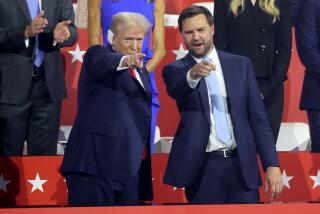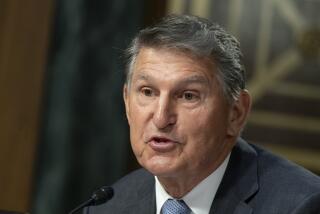Between a maverick and a hard place
John McCain and the adjective “maverick” were once seemingly inseparable, and his quixotic attempt in 2000 to win the Republican presidential nomination helped weld that link.
But now that the Arizona senator is about to become his party’s nominee, he finds himself in an uncomfortable spot: having to defend his reputation as a political independent.
McCain’s campaign unveiled an ad last week that calls him “the original maverick,” and he has retooled his stump speech to remind independent voters disenchanted with Republicans that he defied his party on campaign finance reform, tobacco regulation and the early Iraq strategy.
Democrats, sensing a weakness, have started to chant that this year’s John McCain is not the voluble insurgent who terrorized his party’s establishment eight years ago.
In Elkhart, Ind., last week, McCain’s Democratic opponent hit this theme hard. “The price he paid for his party’s nomination has been to reverse himself on position after position,” Barack Obama told voters at a town hall meeting. “And now he embraces the failed Bush policies over the last eight years -- politics that helped break Washington in the first place. And that doesn’t exactly meet my definition of a maverick.”
This debate over McCain’s maverick-ness reflects a new challenge in his second bid for the presidency: the dilution of the McCain brand. To win the GOP primary this year, McCain embraced party dogma in ways big and small, from switching his opposition to President Bush’s tax cuts, which he had criticized as skewed to the rich, to making amends with religious leaders he once denounced as “agents of intolerance.”
The campaign has also undercut McCain’s image as a straight-talker by dramatically limiting the national media’s access to the candidate, who once charmed reporters and voters alike with his easy, free-wheeling, common-man conversational style on his campaign bus.
And McCain, this time around, faces an opponent who can make a case that, as a 47-year-old black man and first-term senator, he is more of a political outsider with a fresh new voice than the 71-year-old veteran of a quarter-century in Congress.
McCain campaign officials said the increased focus on their candidate’s maverick credentials was long planned. “It was always going to have to be a part of our campaign for the general election,” top advisor Charles Black said.
But Black acknowledged that the campaign thought it was also important to directly rebut Obama’s central line of attack -- that McCain represents a third Bush term.
“Sure he’s been in Washington 26 years, but he’s always been a reformer, always worked across party lines, sacrificed his own political interests to do so,” Black said. “So we were always going to have to tell that narrative, because some people know it, but not everybody.”
McCain staffers bristle at Democratic contentions that their candidate is no longer a maverick, pointing to his belief that global warming is caused by pollution and his willingness to criticize Republicans for pork-barrel spending.
Analysts say many voters will probably continue to see McCain as a political contrarian. “He can point to areas where he broke with the Bush administration, where he broke with his own party,” said Charles H. Franklin, a political science professor at the University of Wisconsin. “That part of the maverick image probably isn’t going away.”
The new emphasis on that image, Franklin said, is to counter possible blow back from the scathing ads the Arizona Republican has launched against Obama. The ads have alarmed some supporters who fear McCain could jeopardize his reputation by appearing to take the political low road.
Last week, McCain’s camp released an ad that contends “we’re worse off than we were four years ago.” The spot calls him “the original maverick,” and says he has a record of taking on corruption “in both parties.” He followed up Thursday with a Web ad made up of clips of prominent Democrats praising him for forging his own path in Washington.
Democrats immediately shot back.
“The John McCain of 2000 wouldn’t even consider voting for the John McCain of 2008,” Democratic Party Chairman Howard Dean, one of the Democrats whose praise of McCain was excerpted in the video, said in a statement. “John McCain has changed: He’s taken the low road, leveling false, negative and misleading attacks against Barack Obama.”
In 2000, few questioned McCain’s maverick credentials. He had stirred anger among conservatives by pushing a ban on the unlimited contributions to the parties that were used to finance campaigns. He locked horns with the tobacco lobby in 1998 when he sponsored an anti-smoking bill that would have raised cigarette taxes and was ultimately derailed by Republicans. He had long rankled colleagues with his campaign against earmarked projects, farm subsidies and pork-barrel spending. And he famously called televangelists Pat Robertson and Jerry Falwell “agents of intolerance.”
His iconoclastic path continued into the early Bush years.
He opposed the Bush tax cuts in 2001 and 2003. As chairman of the Senate Committee on Indian Affairs, he pursued lobbyist Jack Abramoff and his associates, who were accused of bilking tribes of millions of dollars -- a move that embarrassed some GOP lawmakers who had dealings with Abramoff. He also angered conservatives by working with Democrats in 2005 to stave off a Senate rule change favored by GOP leaders that would have eased the path of the administration’s conservative judicial nominees.
But McCain’s positioning for the 2008 race undercut that firebrand image. He now supports making the Bush tax cuts permanent. He has vowed to appoint conservative judges. And he gave the commencement speech at Falwell’s college, Liberty University. “I do not believe in holding grudges in life or in politics,” McCain said at the time.
“Around 2005 or so, he realized he was running for president and he made a calculated decision . . . he was going to do whatever was necessary to win this office,” said Matt Welch, editor in chief of Reason magazine, whose book “McCain” is subtitled “The Myth of a Maverick.”
Nonetheless, analysts say McCain still fits into a venerable tradition of legislators who tend to back their political party but will go against it on key issues. “A maverick doesn’t mean you’re always against your party,” said Julian Zelizer, a history professor at Princeton University.
Zelizer pointed to the lingering distrust of McCain within the GOP. “So many Republicans just hate him because he doesn’t play ball,” he said. “That’s the definition of what a maverick is.”
Those resentments have created a delicate balancing act. McCain cannot denigrate Bush and GOP orthodoxy to the point that he alienates already-unenthused Republican voters. But he also must convince independents and conservative Democrats disillusioned by Bush’s presidency that his outsider credentials are genuine.
“He needs to basically keep those two groups, who fundamentally hate each other’s guts on every issue, behind him,” Welch said.
--
maeve.reston@latimes.com
Times staff writer Peter Nicholas contributed to this report.
More to Read
Get the L.A. Times Politics newsletter
Deeply reported insights into legislation, politics and policy from Sacramento, Washington and beyond. In your inbox three times per week.
You may occasionally receive promotional content from the Los Angeles Times.











